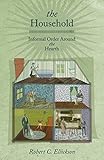The Household : Informal Order around the Hearth / Robert C. Ellickson.
Material type: TextPublisher: Princeton, NJ : Princeton University Press, [2010]Copyright date: ©2008Edition: Course BookDescription: 1 online resource (272 p.) : 2 line illus. 6 tablesContent type:
TextPublisher: Princeton, NJ : Princeton University Press, [2010]Copyright date: ©2008Edition: Course BookDescription: 1 online resource (272 p.) : 2 line illus. 6 tablesContent type: - 9780691147994
- 9781400834150
- 339.4/7 22
- HB820 .E45 2010
- online - DeGruyter
- Issued also in print.
| Item type | Current library | Call number | URL | Status | Notes | Barcode | |
|---|---|---|---|---|---|---|---|
 eBook
eBook
|
Biblioteca "Angelicum" Pont. Univ. S.Tommaso d'Aquino Nuvola online | online - DeGruyter (Browse shelf(Opens below)) | Online access | Not for loan (Accesso limitato) | Accesso per gli utenti autorizzati / Access for authorized users | (dgr)9781400834150 |
Frontmatter -- Contents -- Preface -- Chapter 1. How Households Differ from Families -- Chapter 2. Household Formation and Dissolution in a Liberal Society -- Chapter 3. The Predominant Strategy: Consorting with Intimates -- Chapter 4. A Historical Overview of Household Forms -- Chapter 5. Are the Household Forms that Endure Necessarily Best? -- Chapter 6. Choosing Which of a Household's Participants Should Serve as Its Owners -- Chapter 7. The Mixed Blessings of Joining with Others -- Chapter 8. Order without Law in an Ongoing Household -- Chapter 9. The Challenge of Unpacking the Household -- Appendix A: Data on Intentional Communities -- Appendix B: Data on Co-housing Communities -- Notes -- Works Cited -- Index
restricted access online access with authorization star
http://purl.org/coar/access_right/c_16ec
Some people dwell alone, many in family-based households, and an adventuresome few in communes. The Household is the first book to systematically lay bare the internal dynamics of these and other home arrangements. Legal underpinnings, social considerations, and economic constraints all influence how household participants select their homemates and govern their interactions around the hearth. Robert Ellickson applies transaction cost economics, sociological theory, and legal analysis to explore issues such as the sharing of household output, the control of domestic misconduct, and the ownership of dwelling units. Drawing on a broad range of historical and statistical sources, Ellickson contrasts family-based households with the more complex arrangements in medieval English castles, Israeli kibbutzim, and contemporary cohousing communities. He shows that most individuals, when structuring their home relationships, pursue a strategy of consorting with intimates. This, he asserts, facilitates informal coordination and tends ultimately to enhance the quality of domestic interactions. He challenges utopian critics who seek to enlarge the scale of the household and legal advocates who urge household members to rely more on written contracts and lawsuits. Ellickson argues that these commentators fail to appreciate the great advantages in the home setting of informally associating with a handful of trusted intimates. The Household is a must-read for sociologists, economists, lawyers, and anyone interested in the fundamentals of domestic life.
Issued also in print.
Mode of access: Internet via World Wide Web.
In English.
Description based on online resource; title from PDF title page (publisher's Web site, viewed 30. Aug 2021)


